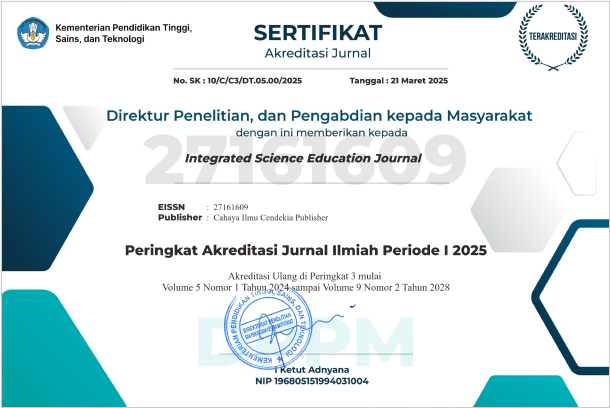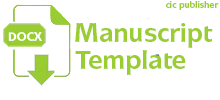The Measuring Energy Literacy: Validation of Knowledge, Attitude, and Behavior Instruments Using the Rasch Model
Abstract
Purpose of the study: This study aims to develop and validate a Rasch Model-based energy knowledge, attitude, and behavior assessment instrument to measure energy literacy among high school students.
Methodology: The research design followed the stages of theory-based instrument development and the Rasch modeling approach. The quantitative approach and instrument development process were carried out through the stages of item preparation based on literature review and theoretical indicators, validation by experts, and field testing of 50 participants.
Main Findings: The knowledge instrument has high quality, obtained as much as 9 data showing a fit for the Rasch model, such as MNSQ infit and outfit values ranging from 0.84 to 1.25. and positive point measure correlations. Instrument reliability shows infit and outfit results that are still within the ideal tolerance range, obtained sequentially the person reliability values of knowledge, attitude, and behavior of 0.50, 0.76 and 0.75. So that the instrument is suitable for accurate and consistent measurement.
Novelty/Originality of this study: this study provides innovation in the energy literacy measurement literature (knowledge, attitude, and behavior) with an in-depth evaluation of item performance and respondent ability distribution using empirical and applicable methods for the development of evidence-based and Rasch model-based assessment instruments.
References
US EIA, “World Energy Outlook 2023 - DOE/EIA (2023),” World Energy Outlook, 2023, 2023.
K. L. Chen, S. Y. Liu, and P. H. Chen, “Assessing multidimensional energy literacy of secondary students using contextualized assessment,” Int. J. Environ. Sci. Educ., 2015, doi: 10.12973/ijese.2015.241a.
S. Wu, Y. Li, C. Fang, and P. Ju, “Energy Literacy of Residents and Sustainable Tourism Interaction in Ethnic Tourism: A Study of the Longji Terraces in Guilin, China,” Energies, 2023, doi: 10.3390/en16010259.
Y. F. Lee, H. B. N. Nguyen, and H. Te Sung, “Energy literacy of high school students in Vietnam and determinants of their energy-saving behavior,” Environ. Educ. Res., 2022, doi: 10.1080/13504622.2022.2034752.
M. Maurer, P. Koulouris, and F. X. Bogner, “Green awareness in action-how energy conservation action forces on environmental knowledge, values and behaviour in adolescents’ school life,” Sustain., 2020, doi: 10.3390/su12030955.
M. Yusup, A. Setiawan, N. Y. Rustaman, and I. Kaniawati, “Pre-service Physics Teachers’ Knowledge, Decision Making, and Self-system Toward Energy Conservation,” J. Pendidik. Fis. Indones., 2018, doi: 10.15294/jpfi.v14i2.16638.
K. A. Babatunde, N. F. Wakimin, S. H. B. Zakaria, M. Soman, and K. Charman, “Determinants of Sustainable Energy Saving Behavior among University Students in Malaysia: A Case Study of Management & Science University (MSU),” Inf. Manag. Bus. Rev., 2023, doi: 10.22610/imbr.v15i3(i).3534.
OECD, “Revenue Statistics in Asia and the Pacific: Key findings for Indonesia,” OECD Tax Stat., 2022.
R. Kc, J. Föhr, and T. Ranta, “Public Perception on the Sustainable Energy Transition in Rural Finland: A Multi-criteria Approach,” Circ. Econ. Sustain., 2023, doi: 10.1007/s43615-022-00206-5.
P. Papon, “AIE (Agence internationale de l’énergie). World Energy Outlook 2023, Paris : AIE octobre 2023, 353 p. URL : https://iea.blob.core.windows.net/assets/42b23c45-78bc-4482-b0f9-eb826ae2da3d/WorldEnergyOutlook2023.pdf . Consulté le 10 janvier 2024,” Futuribles, 2024, doi: 10.3917/futur.459.0114.
K. S. Ermenc and E. K. Niemczyk, “Education for Sustainable Development,” Sodobna Pedagogika/Journal of Contemporary Educational Studies . 2022. doi: 10.21300/21.4.2020.2.
A. Lange Salvia, L. Londero Brandli, W. Leal Filho, B. Gasparetto Rebelatto, and G. Reginatto, “Energy sustainability in teaching and outreach initiatives and the contribution to the 2030 Agenda,” Int. J. Sustain. High. Educ., 2020, doi: 10.1108/IJSHE-05-2020-0180.
H. Husamah, H. Suwono, H. Nur, and A. Dharmawan, “Sustainable development research in Eurasia Journal of Mathematics, Science and Technology Education: A systematic literature review,” Eurasia J. Math. Sci. Technol. Educ., 2022, doi: 10.29333/ejmste/11965.
D. R. E. Cotton, W. Miller, J. Winter, I. Bailey, and S. Sterling, “Developing students’ energy literacy in higher education,” Int. J. Sustain. High. Educ., 2015, doi: 10.1108/IJSHE-12-2013-0166.
J. DeWaters and S. Powers, “Establishing measurement criteria for an energy literacy questionnaire,” J. Environ. Educ., 2013, doi: 10.1080/00958964.2012.711378.
R. Rohmatulloh, A. Hasanah, L. Sahlani, M. T. Zuhri, N. Kholifah, and M. Nurtanto, “A Systematic Review of Energy Literacy Programs at Primary and Middle Schools,” Pegem Egit. ve Ogr. Derg., 2022, doi: 10.47750/pegegog.13.01.17.
A. Reid, “Climate change education and research: possibilities and potentials versus problems and perils?,” Environmental Education Research. 2019. doi: 10.1080/13504622.2019.1664075.
M. Wilson, CONSTRUCTING MEASURES: An Item Response Modeling Approach, Second Edition. 2023. doi: 10.4324/9781003286929.
W. J. Boone and J. R. Staver, “Correction to: Advances in Rasch Analyses in the Human Sciences,” in Advances in Rasch Analyses in the Human Sciences, 2020. doi: 10.1007/978-3-030-43420-5_21.
A. A. Latif, M. Najib, W. H. Libunao, N. M. Amin, and C. J. Peter, “Enhancing student ’ s akhlaq behaviour through holistic assessment,” Int. Conf. Soc. Sci. Res. ICSSR 2013, 2013.
B. D. Solomon, “United Nations Environment Programme (UNEP),” in Dictionary of Ecological Economics: Terms for the New Millennium, 2023. doi: 10.4337/9781788974912.U.7.
R. García-Sierra, M. I. Fernández-Cano, M. Jiménez-Pera, M. Feijoo-Cid, and A. Arreciado Marañón, “Knowledge about the best practice guidelines in the nursing degree: A non-randomized post-test design,” Nurs. Open, 2024, doi: 10.1002/nop2.2074.
T. G. Bond, Z. Yan, and M. Heene, Applying the rasch model: Fundamental measurement in the human sciences. 2020. doi: 10.4324/9780429030499.
L. Tesio, A. Caronni, D. Kumbhare, and S. Scarano, “Interpreting results from Rasch analysis 1. The ‘most likely’ measures coming from the model,” Disabil. Rehabil., 2024, doi: 10.1080/09638288.2023.2169771.
T. H. Fiskawarni, R. Rahmawati, W. Widiasih, and R. Saad, “The Design and Validation of the Four Tier Test Instrument for Energy Literacy Using the Rasch Model Analysis,” JIPF (Jurnal Ilmu Pendidik. Fis., vol. 9, no. 1, p. 74, 2024, doi: 10.26737/jipf.v9i1.4717.
E. Avinç and F. Doğan, Digital literacy scale: Validity and reliability study with the rasch model, vol. 29, no. 17. Springer US, 2024. doi: 10.1007/s10639-024-12662-7.
P. Susongko, “Construct Validation with Rasch Modeling of Pedagogical Literacy Measurement Instrument for Teachers in Junior High School Environment,” vol. 10, no. 16, pp. 312–322, 2025.
J. Yang, Z. Reheman, Y. Liu, and S. Zhao, “Applying Rasch analysis in refinement and validation of interpersonal skills measure for gifted children,” Front. Psychol., 2023, doi: 10.3389/fpsyg.2023.1236640.
G. H. Alnahdi, J. Goldan, and S. Schwab, “Psychometric Properties and Rasch Validation of the Teachers’ Version of the Perception of Resources Questionnaire,” Front. Psychol., 2021, doi: 10.3389/fpsyg.2021.633801.
A. Rahim and H. Haryanto, “Implementation of Item Response Theory (IRT) Rasch Model in Quality Analysis of Final Exam Tests in Mathematics,” J. Educ. Res. Eval., 2021, doi: 10.15294/jere.v10i2.51802.
O. Aman, T. Z. Ningsih, and N. F. Abidin, “The Development of Historical Thinking Assessment to Examine Students’ Skills in Analyzing the Causality of Historical Events,” Eur. J. Educ. Res., 2022, doi: 10.12973/eu-jer.11.2.609.
M. Bond, S. Bedenlier, V. I. Marín, and M. Händel, “Emergency remote teaching in higher education: mapping the first global online semester,” Int. J. Educ. Technol. High. Educ., vol. 18, no. 1, 2021, doi: 10.1186/s41239-021-00282-x.
R. Sari and M. N. I. Saleh, “Rasch Model Application: Instrument Development of Readiness to Conduct Inclusive Learning,” Psympathic J. Ilm. Psikol., 2023, doi: 10.15575/psy.v9i2.10058.
N. V. Morgacheva, S. V. Shcherbatykh, and E. B. Sotnikova, “Assessment and analysis of the level of natural science literacy of students,” Perspekt. Nauk. i Obraz., 2023, doi: 10.32744/pse.2023.2.4.
M. Yusup, A. Setiawan, N. Y. Rustaman, and I. Kaniawati, “Developing a Framework for the Assessment of Pre-Service Physics Teachers’ Energy Literacy,” J. Phys. Conf. Ser., vol. 877, no. 1, 2017, doi: 10.1088/1742-6596/877/1/012014.
M. Yusup, “Using Rasch model for the development and validation of energy literacy assessment instrument for prospective physics teachers,” in Journal of Physics: Conference Series, 2021. doi: 10.1088/1742-6596/1876/1/012056.
S. A. Alatas, M. Jahja, and M. Yusuf, “Assessment of students’ science literacy skills using diagnostic items on the concept of energy with Rasch modeling,” World J. Adv. Res. Rev., 2024, doi: 10.30574/wjarr.2024.21.1.2697.
M. Yusup, A. Setiawan, N. Y. Rustaman, and I. Kaniawati, “Assessing Pre-Service Physics Teachers’ Energy Literacy: An Application of Rasch measurement,” J. Phys. Conf. Ser., vol. 895, no. 1, 2017, doi: 10.1088/1742-6596/895/1/012161.
K. Thayaseelan, Y. Zhai, S. Li, and X. Liu, “Revalidating a measurement instrument of spatial thinking ability for junior and high school students,” Discip. Interdiscip. Sci. Educ. Res., vol. 6, no. 1, 2024, doi: 10.1186/s43031-024-00095-8.
Y. Oktalia, A. B. Susila, and B. H. Iswanto, “Virtual test instruments to measure scientific literacy of high school students on work and energy,” in Journal of Physics: Conference Series, 2021. doi: 10.1088/1742-6596/2019/1/012009.
E. Bartholomew, N. Iqbal, and O. Medvedev, “Enhancing the Assessment of Gratitude in Mindfulness Research: a Rasch Analysis of the 6-Item Gratitude Questionnaire,” Mindfulness (N. Y)., 2022, doi: 10.1007/s12671-022-02006-2.
L. Tesio, A. Caronni, A. Simone, D. Kumbhare, and S. Scarano, “Interpreting results from Rasch analysis 2. Advanced model applications and the data-model fit assessment,” Disabil. Rehabil., 2024, doi: 10.1080/09638288.2023.2169772.
J. M. Linacre, “Rasch dichotomous model vs. one-parameter logistic model (1PL 1-PL),” Rasch Meas. Trans., 2005.
A. Sukri, M. A. Rizka, E. Purwanti, S. Ramdiah, and M. Lukitasari, “Validating Student’s Green Character Instrument Using Factor and Rasch Model,” Eur. J. Educ. Res., 2022, doi: 10.12973/eu-jer.11.2.859.
M. N. Mamat and F. Mokhtar, “Reliable assessment model for affective environmental education: Rasch model made simple,” in 2012 International Conference on E-Learning and E-Technologies in Education, ICEEE 2012, 2012. doi: 10.1109/ICeLeTE.2012.6333387.
H. Lahza, H. Khosravi, and G. Demartini, “Analytics of learning tactics and strategies in an online learnersourcing environment,” J. Comput. Assist. Learn., 2023, doi: 10.1111/jcal.12729.
N. F. Ramli, O. Talib, S. A. Hassan, and U. K. A. Manaf, “Development and Validation of an Instrument to Measure STEM Teachers’ Instructional Preparedness,” Asian J. Univ. Educ., 2020, doi: 10.24191/ajue.v16i3.11084.
N. E. M. Razali, R. Z. Ramli, H. Mohamed, N. A. Mat Zin, F. Rosdi, and N. Mat Diah, “Identifying and validating game design elements in serious game guideline for climate change,” Heliyon, 2022, doi: 10.1016/j.heliyon.2022.e08773.
T. LeVasseur and C. Ciarcia, “Sustainability literacy in a time of socio-ecological crisis: Using reaccreditation as a leverage point for innovation in higher education,” Sustain., 2019, doi: 10.3390/su11185104.
L. Wang, Y. Yuan, and G. Wang, “The Construction of Civil Scientific Literacy in China from the Perspective of Science Education,” Sci. Educ., 2024, doi: 10.1007/s11191-022-00367-7.
Copyright (c) 2025 Inda Hasanah Bimastari, Muhamad Yusup, Kistiono Kistiono

This work is licensed under a Creative Commons Attribution 4.0 International License.
Authors who publish with this journal agree to the following terms:
- Authors retain copyright and acknowledge that the Integrated Science Education Journal is the first publisher licensed under a Creative Commons Attribution 4.0 International License.
- Authors are able to enter into separate, additional contractual arrangements for the non-exclusive distribution of the journal's published version of the work (e.g., post it to an institutional repository or publish it in a book), with an acknowledgment of its initial publication in this journal.
- Authors are permitted and encouraged to post their work online (e.g., in institutional repositories or on their website) prior to and during the submission process, as it can lead to productive exchanges and earlier and greater citation of published work.







.png)
.png)






